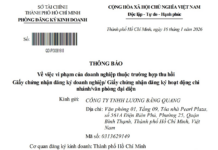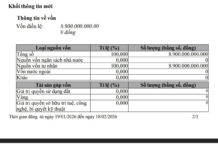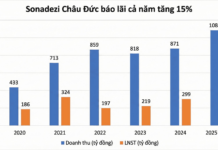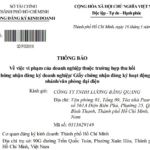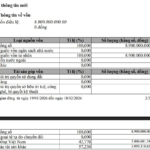A well-known Japanese fashion brand celebrated its 5th anniversary in Vietnam. Over the past five years, since the opening of its first store (UNIQLO Dong Khoi) in Ho Chi Minh City, the brand has expanded to 26 retail stores in prime locations across major cities in Vietnam, along with an online store.
International Brands Dominating the Market
“Reflecting on UNIQLO’s journey in Vietnam over the past five years, we are proud that our LifeWear apparel has contributed to bringing positive values and changes to Vietnamese people and society, becoming the choice of many customers in their daily lives,” said Mr. Nishida Hideki, General Director of UNIQLO Vietnam, at the anniversary celebration held in Ho Chi Minh City on November 26.
According to UNIQLO’s announcement, the brand has continuously expanded its retail system, and each new store opening has been met with overwhelming customer turnout. In the field of e-commerce, their revenue has also grown by up to 140% annually.
The company has just announced its plan to establish a presence in all three regions of Vietnam: the North, Central, and South. As part of this strategy, the Japanese fashion brand will expand to Bien Hoa, Dong Nai, and open its first store in Central Vietnam—UNIQLO AEON MALL Hue—in 2025.
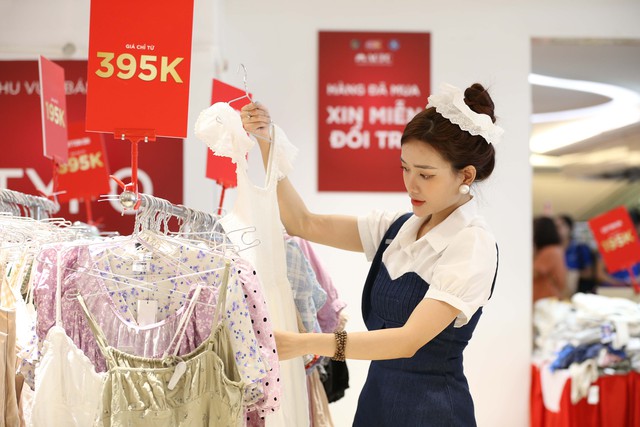
International and Vietnamese fashion brands are taking advantage of year-end promotions to attract customers. Photo: HOANG TRIEU
UNIQLO is not the only international fashion brand thriving in Vietnam, especially in Ho Chi Minh City. Many other well-known international brands, such as Zara, Mango, H&M, Nike, and Adidas, have also established themselves in the Vietnamese market and can be found in most major shopping malls, including Union Square, Diamond Plaza, Gigamall, Van Hanh Mall, SC VivoCity, and Cressent Mall.
Additionally, some brands have opened large, spacious stores spanning one or two floors in these malls (Muji, UNIQLO, etc.). In contrast, the stores of Vietnamese fashion manufacturers like Ninomaxx, Viet Thang Jeans, and Canifa appear modest and simplistic, making them less noticeable compared to the expansive and trendy offerings of their international counterparts.
Many believe that the rapid growth of young, affluent consumers who quickly adapt to international consumption trends and have refined taste in daily fashion, along with other favorable conditions, has made it much easier to access and shop for international “branded” fashion in Vietnam.
Vietnamese Brands Losing Ground
While the Vietnamese fashion market hasn’t grown significantly, the explosive growth of international fashion brands has resulted in a shrinking market share for domestic brands. Additionally, competition from low-cost Chinese fashion products flooding e-commerce platforms and online markets threatens the existence of Vietnamese fashion brands.
In late July 2024, the Catsa men’s fashion chain suddenly announced the closure of all 22 of its stores after more than 13 years of establishment and development. Recently, the well-known Northern brand Lep’ also decided to end its eight-year journey, closing all 17 branches nationwide. Several other brands, such as Mieu and Ivy Moda, have also withdrawn from the fashion business this year.
Even on e-commerce platforms, a KOL (Key Opinion Leader) named Thu Nhi recently announced that she would stop selling her self-built fashion brand, MEO, due to poor sales.
The leaders of these Vietnamese fashion brands shared a common reason for their decision: “We cannot keep up with the rapid development of the fashion market and the dizzying changes in consumer tastes.”
Mr. Le Viet Thanh, Director of K&K Fashion (which currently owns a chain of 13 stores), pointed out the challenge for domestic fashion companies in reaching new customers. He emphasized the need for continuous creativity, trend awareness, and even trendsetting to attract and retain customers in today’s market.
“The fashion industry is dynamic and competitive, with many brands emerging and disappearing annually. Some brands start strong and catch the latest trends but eventually lose steam, as their designs fail to resonate with the market,” Mr. Thanh analyzed.
According to Mr. Thanh, Vietnamese fashion companies tend to be small-scale, with young and inexperienced design teams. Most of these companies target office workers and middle-aged customers. However, this group tends to be more conservative in their spending post-pandemic. In contrast, Gen Z consumers are the primary target of international fashion brands.
“The gap in fashion preferences between these two customer groups is significant. As a result, it is challenging for Vietnamese fashion brands to appeal to younger customers,” Mr. Viet Thanh observed.
Embracing Online Sales
Mr. Pham Van Viet, Vice President of the Ho Chi Minh City Textile, Embroidery, Knitting, and Sewing Association and General Director of Viet Thang Jeans, emphasized the importance of e-commerce in today’s market. He stated that companies must adapt and effectively utilize this channel for brand promotion and sales.
“When traditional stores became less efficient, Viet Thang Jeans quickly shifted focus to e-commerce in 2023, investing heavily in online sales and regular livestreaming sessions. The results have been very positive,” Mr. Viet shared.
The Ultimate Guide to Fashion: Why This TikToker’s Brand is Shutting Down
“Meo”, a fashion brand founded by prominent TikToker Thu Nhi, with her “Eat Clean Hong” profile boasting over 2 million followers, has abruptly ceased operations.
The Great 1688 Shopping Festival: A Bonanza of Deals for Vietnam
In a swift move, China’s leading wholesale e-commerce platform, 1688, has launched a series of promotions and marketing campaigns targeted at Vietnamese consumers, just shortly after its Vietnamese language version went live. With competitive pricing compared to domestic e-commerce platforms, 1688 is making a bold statement in the Vietnamese market.






